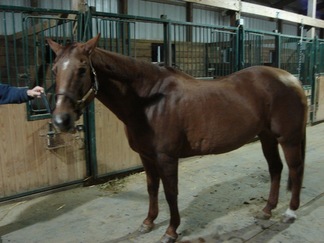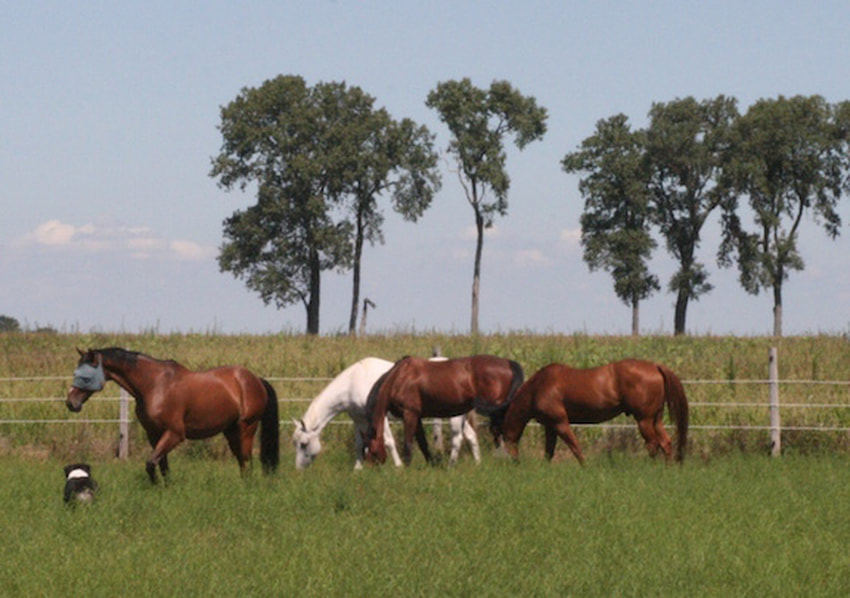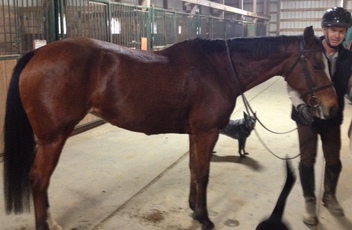Caring for the Aging Horse
Horses are living longer now--well into their 30's! Here is how to care for your equine friends as they age.
You would think it would be possible to get a simple answer to the simple question, "What is the average life expectancy for a horse?" You would think that, but you would be wrong.
According to experts, domestic horses in the U.S. have an average lifespan of 18-22 years, depending on the breed. Ponies can live twice as long, as can wild Mustangs. In the wild, Mustangs can live up to 40 years in large part because hurt or disabled horses are protected by the herd. http://www.livescience.com/27686-mustangs.html
But one thing is clear: The average lifespan of domestic horses is increasing. One study found a sixfold increase in horses over the age of 20 presenting at veterinary hospitals for treatment, according to Dr. Mary Rose Paradis, DVM, MS, Dipl. ACVIM, an associate professor in the Department of Clinical Sciences at Tufts University in Massachusetts.
But older doesn't necessarily mean frailer. Horses that receive good nutrition and regular veterinary care can remain strong, rideable, and downright frisky well past the age of 20.
According to experts, domestic horses in the U.S. have an average lifespan of 18-22 years, depending on the breed. Ponies can live twice as long, as can wild Mustangs. In the wild, Mustangs can live up to 40 years in large part because hurt or disabled horses are protected by the herd. http://www.livescience.com/27686-mustangs.html
But one thing is clear: The average lifespan of domestic horses is increasing. One study found a sixfold increase in horses over the age of 20 presenting at veterinary hospitals for treatment, according to Dr. Mary Rose Paradis, DVM, MS, Dipl. ACVIM, an associate professor in the Department of Clinical Sciences at Tufts University in Massachusetts.
But older doesn't necessarily mean frailer. Horses that receive good nutrition and regular veterinary care can remain strong, rideable, and downright frisky well past the age of 20.

Here is Smokey, a 30 year old Quarterhorse who started life as a cutting horse, became a young rider's Pony Club mount, and later trained through first level dressage.
In a recent TheHorse.com interview, Dr. Paradis shared the following tips on how to maintain senior horses' health. First and foremost is proper veterinary care. She recommends that aging horses should have annual or biannual veterinary geriatric checkups, which include:
- A thorough physical examination, focusing on body condition, dental wear, appetite, hair coat abnormalities, musculoskeletal stiffness or lameness, ophthalmic abnormalities, and cardiac health;
- Blood work, including a complete blood count, chemistry profile, adrenocorticotropic hormone levels, and insulin levels; and
- A fecal egg count.
Here are the highlights of this intriguing interview.
1. Older horses need special diets.
Forage (good quality hay) is the main component of the diet for YOUNGER horses. Older horses? Not so much.
Older horses often can't chew forage like hay, so senior feeds are supposed to be fed alone. (Click here to learn more about equine teeth. No, they don't grow throughout the lifespan. They are fully formed at birth but most of the tooth resides above the gum line. By the time a horse reaches the second decade of life, there isn't a lot of tooth left.)
Colic is the most common reason for senior horses to be seen by a veterinarian. And the most common cause of death in older horses is gastrointestinal lesions (tissue damage, such as an ulcer, wound, or tear.)
Dental disease is thought to play a significant role in the development of colic and choke in older horses. She cited one British study that showed 95% of horses older than 15 years of age had dental abnormalities, but only 10% of owners were aware of the problem.
To help your senior horse, Paradis recommends feeding
- Extruded feed to increase digestion;
- Pre- and probiotics to increase digestive flora;
- Higher fat concentrations to increase caloric intake;
- Higher protein concentrations to help maintain or build muscle mass; and
- Amino acids to aid in muscle maintenance, hair coat quality, and hoof quality.
(You can find our recommendations for extruded feeds (like Purina's Equine Senior) and supplements by hovering your cursor or mouse over "Recommended Products" in the main menu to the left.)
2. All horses need strict parasite control, but it is critical for the older horse.
Worms and other parasites wreak havoc on a horse's gastrointestinal system. They can perforate the intestinal lining, lay eggs that embed in the lining and cause scarring, and can interfere with proper digestion. Even worse, this kind of damage can be cumulative over the lifespan of a horse. Make sure to have a fecal egg count done twice a year, and deworm according to your veterinarian's recommendations. Low counts can usually be addressed with a dewormer that contains ivermectin or moxidectin plus praziquantel. Heavy counts may need something like a Panacur PowerPak. (Click here for our recommendations, but always follow your vet's advice.)
3. Provide support for aging muscles and joints.
For arthritis and other joint problems, Paradis recommends the following:
- Provide non-steroidal anti-inflammatory drugs judiciously;
- Increase mobility to reduce pain, and avoid stall rest;
- Modify the horse's training program so to not overtax his body's abilities;
- Work horses consistently, rather than infrequently or just on the weekends;
- Consider adding a nutriceutical, such as glucosamine-chondroitin sulfate, which has been shown to improve lameness grades, flexion test scores, and increase stride length; and
- Contemplate adding complementary therapies, such as acupuncture, chiropractic, or massage therapy, to the horse's health care regimen.
4. Help your horse breath, or why turnout is NOT optional.
According to Paradis, the third most common presenting complaint for geriatric horses is respiratory disease, such as heaves. Treatment focuses on decreasing inflammation and bronchoconstriction (tightening of the airways), which can be accomplished by:
- Reducing environmental allergens, such as dust;
- Providing 24-hour turnout;
- Eliminating hay—which can contain dust—from the horse's diet;
- Improving ventilation if the horse must be stalled; and
- Administering oral or inhaled corticosteroids and bronchodilators.
5. Look them in the eye.
Paradis cited a study that found 94% of horses older than 15 years of age had at least one eye abnormality. Eye problems can be deadly serious, so don't ignore them. Click here to learn why.
6. Saying goodbye.
This is the most difficult decision for horse owners to make: When is it time to say goodbye? You owe it to your horse to make this decision with wisdom and compassion. According to Paradis, the main factors that horse owners need to consider are simple: A "hopeless" prognosis, veterinary advice, and poor quality of life. If you own horses, it is a certainty that you will have to make this decision at some point. Make sure you have money set aside to pay for humane euthanasia of your equine friends. That is the final gift of loving care that you can give them. Or as I like to put it, they come into your life and offer you unconditional love and friendship, and the only time they hurt you is when they leave. But the memories they give us enrich and deepen our lives.
Copyright Denise Cummins, PhD 9/9/2015
Update 9/11/2015
Some commenters on social media questioned the validity of the age spans cited in this article. Specifically, many commenters were under the impression that horses are regularly living well into their 30's today. While horses are certainly living longer and more horses are living into their 30's, equines who pass the three decade mark are not the norm. Here is more information:
A 2007 report by the Centers for Epidemiology and Animal Health that included a census of almost 3,000 equine facilities involving about 10,000 horses. The report found that "the highest percentage of resident equids (56.7 percent) were 5 to less than 20 years of age. Just 7.6 percent of resident equids were 20 years or older." https://www.aphis.usda.gov/animal_health/nahms/equine/downloads/equine05/Equine05_is_Demographics.pdf
The Hospital for Large Animals at Cummings School of Veterinary Medicine at Tufts University conducted a horse owner and equine practitioner survey in the Fall of 2007 that looked at the demographics of the equine population in New England. There are an estimated 98,000 horses in this region. The owner survey (329 respondents – approximately 1000 horses) indicated that only14% of these horses were aged 20-29, and only 1% were 30 or older. http://geriatrichorse.org/LinkClick.aspx?fileticket=SFWZWdd%2B2U0%3D&tabid=592&mid=1699

